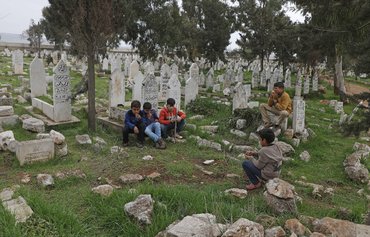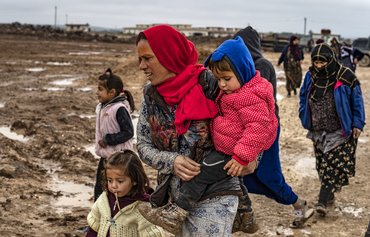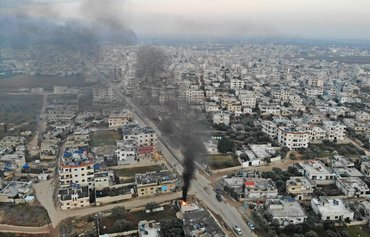An estimated 170,000 of the roughly 900,000 civilians forced from their homes in a massive wave of displacement in north-western Syria are living out in the open, the UN said Thursday (February 20th).
The largest displacement since the civil war in Syria broke out nearly nine years ago comes in the thick of winter, with temperatures often dipping below zero Celsius and snow covering some districts.
"Harsh winter conditions further aggravate the suffering of these vulnerable people who fled their homes to escape the violence, most of whom have been displaced multiple times over nine years of conflict," the UN said.
In its latest update, the UN Office for the Co-ordination of Humanitarian Affairs (OCHA) said around a fifth of those newly displaced were sleeping rough.
![A girl walks with a bucket outside a make-shift shelter, where Syrians displaced by advancing regime forces are encamped in the countryside of the village of Saharah, on the western edge of Syria's Aleppo province on February 15th. [Ibrahim Yasouf/AFP]](/cnmi_di/images/2020/02/21/22596-Syria-makeshift-camp-600_384.jpg)
A girl walks with a bucket outside a make-shift shelter, where Syrians displaced by advancing regime forces are encamped in the countryside of the village of Saharah, on the western edge of Syria's Aleppo province on February 15th. [Ibrahim Yasouf/AFP]
"Almost 170,000 of those newly displaced people are estimated to be living in the open or in unfinished buildings," it said.
The UN said that the camps sheltering some of the rest were overstretched and that many families were pitching tents on plots with no access to basic services such as latrines.
Need to avert a humanitarian disaster
The UN's top humanitarian co-ordinator Mark Lowcock had warned earlier this week that a ceasefire was needed to avert a humanitarian disaster on a scale yet unseen in the Syria war.
But in a Wednesday vote at the UN Security Council, Russia blocked a resolution demanding a ceasefire.
Backed by Russian warplanes, Syrian regime and allied forces have been closing in on the last bastion of armed opposition.
A pincer movement of forces thrusting their way into Idlib from the south and from Aleppo to the east is boxing holdouts into an ever-shrinking enclave.
It is also forcing the estimated three million people into an increasingly confined and densely populated area near the border with Turkey.
The UN has called on Turkey to take in more refugees, arguing that the emergency is extreme.
Turkey, which already hosts the world's largest number of Syrian refugees with around 3.6 million people, wants to avoid another mass influx.

![An internally-displaced Syrian boy is pictured in a camp in Sarmada in the north of Syria's north-western Idlib province on February 17th. [Rami al-Sayed/AFP]](/cnmi_di/images/2020/02/21/22604-Internally-displaced-boy-600_384.jpg)
![A Syrian girl carries a basket in Sarmada in Idlib province on February 17th. [Rami al-Sayed/AFP]](/cnmi_di/images/2020/02/21/22597-Syrian-girl-Sarmada-600_384.jpg)
![A displaced woman holds a child in a camp in Sarmada in Syria's Idlib province on February 17th. [Rami al-Sayed/AFP]](/cnmi_di/images/2020/02/21/22601-Sarmada-displaced-child-600_384.jpg)
![Displaced Syrians ride a motorcycle as they arrive to Deir al-Ballut camp in Afrin's countryside along the border with Turkey, on February 19th. [Rami al-Sayed/AFP]](/cnmi_di/images/2020/02/21/22603-Displaced-Syrians-motorbike-600_384.jpg)






